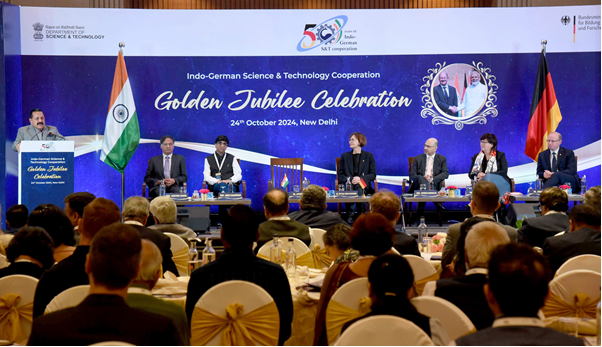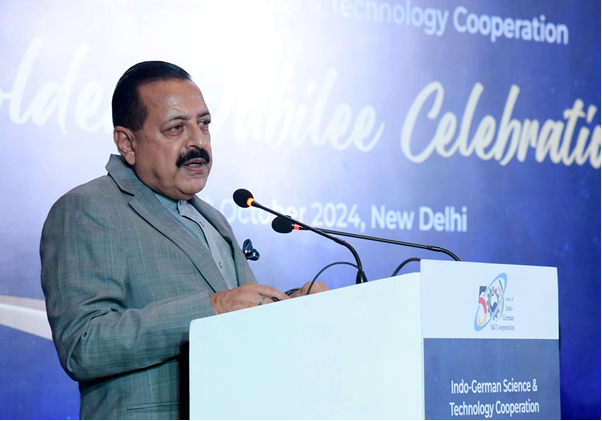Last 10 years have witnessed manifold rise in Indo-German collaboration". This was the instant response of Union Minister of State (Independent Charge) for Science and Technology, Minister of State (Independent Charge) for Earth Sciences, MoS PMO, Department of Atomic Energy, Department of Space, Personnel, Public Grievances and Pensions Dr. Jitendra Singh when Federal Minister of Education and Research of Germany, Ms. Bettina Stark-Watzinger congratulated him on the Golden Jubilee celebration of Indo-German collaboration in Science & Technology.
The very first engagement of the German Minister who arrived at the national capital this morning was a high-level delegation meeting with India's Science Minister.
India and Germany commemorated 50 years of successful collaboration in science and technology at a landmark event attended by Union Minister Dr. Jitendra Singh and Federal Minister of Education and Research of Germany, Ms. Bettina Stark-Watzinger. The Golden Jubilee celebration, held in New Delhi, reflected on the remarkable advancements achieved through this long-standing partnership and set the stage for deeper cooperation in the coming decades.

Addressing the gathering, Dr. Jitendra Singh emphasized that the Indo-German partnership in science and technology has grown significantly over the past decade, contributing to both nations’ progress in various scientific fields. “This is a golden jubilee of a golden collaboration,” the Minister remarked. “What began 50 years ago has transformed into a robust, multi-faceted relationship that has touched almost every aspect of science and technology, from space exploration to biotechnology, and from climate action to artificial intelligence.”
He expressed gratitude for the active involvement of the scientific communities from both countries, noting that their dedication has been pivotal in advancing the bilateral relationship. “The past 50 years have laid a solid foundation, and I am confident that the next 50 years will bring even more impactful innovations and breakthroughs for both nations. Together, India and Germany will continue to address global challenges through cutting-edge scientific research and technological innovation,” Dr. Jitendra Singh said.
Highlighting India’s remarkable strides under Prime Minister Narendra Modi’s leadership, Dr. Jitendra Singh pointed to India’s rise as a global leader in space technology. “India’s space journey has seen a quantum leap, culminating in our Chandrayaan-3 mission, which made India the first country to land on the southern pole of the moon,” he said. “This milestone, coupled with the opening of the space sector to private players, showcases India’s commitment to embracing the future of space exploration.”
Union Minister also underscored the role of biotechnology in transforming India’s scientific landscape, revealing that India has grown from just 50 biotech startups to over 8,000 in a span of 10 years. He highlighted the recent introduction of India’s Bio-E3 initiative, which focuses on biotechnology for the environment, economy, and employment. “We foresee biotechnology playing a major role in driving the next industrial revolution, and India is already positioning itself as a leader in this field,” he added.
In his speech, Dr. Jitendra Singh spoke about the broader implications of science and technology for the common man. He emphasized that under the Modi government, India has ensured that scientific advancements translate into tangible benefits for the public, particularly in areas like healthcare, agriculture, and climate action. “Science and technology must ultimately serve the people,” the Minister stressed. “Whether it is space technology entering every household or AI helping optimize healthcare, our goal is to bring ease of living for the common man.”
Looking ahead, Dr. Jitendra Singh reaffirmed India’s commitment to collaborating with Germany in emerging areas such as artificial intelligence, quantum technology, and green hydrogen fuel. He also mentioned India’s Deep Ocean Mission, which aims to explore the vast resources of the ocean, as another area where Indo-German collaboration can thrive. “As we continue to explore new frontiers, it is vital that we work together, not just government-to-government, but also through collaborations in the private sector,” Dr. Jitendra Singh stated.
Federal Minister Ms. Bettina Stark-Watzinger expressed Germany’s deep appreciation for the collaborative spirit between the two nations. She praised India’s recent advancements in space and technology, especially its successful moon landing, and emphasized the need for continued partnership in tackling global challenges. “We need moonshot ambition,” Ms. Stark-Watzinger said. “India has already shown its capability by landing on the moon and launching a probe to the sun. We have every reason to celebrate not just the past but also to look forward to future milestones in our cooperation.”

Ms. Stark-Watzinger also highlighted the importance of international collaboration in addressing critical global issues such as energy, food security, and healthcare. “A world where there are no worries about energy, where food supply is secured, and where healthcare is enhanced through state-of-the-art technologies is within our reach. Through science and technology, together we can make the world a better place,” she remarked, reinforcing the significance of deepening ties between India and Germany for the benefit of humanity.
The event also marked the successful establishment of the International Research Training Group, a joint initiative between India and Germany focusing on photoluminescence in supra-molecular matrices. Dr. Jitendra Singh hailed this collaboration as a testament to the scientific prowess of both nations and expressed optimism about the future of bilateral research and development.
During the event, three significant Memoranda of Understanding (MoUs) were signed to further strengthen Indo-German collaboration in science and technology. The first MoU, a Joint Declaration of Intent (JDI), was signed between Prof. Abhay Karandikar, Secretary of the Department of Science & Technology (DST), and Prof. Joybrato Mukherjee, President of the German Academic Exchange Service (DAAD). This agreement aims to enhance innovation and incubation ecosystems through an exchange programme, fostering knowledge sharing between policymakers, startup incubation professionals, and deep-tech startups from both countries. Dr. Jitendra Singh and Ms. Bettina Stark-Watzinger witnessed the signing, reaffirming the commitment to leveraging collective expertise for scientific advancements.
Another MoU was signed between the Indo-German Science and Technology Centre (IGSTC) and Bharat Petroleum Corporation Limited (BPCL), represented by Mr. R. Madhan and Mr. N. Chandrashekar, respectively. This partnership will focus on renewable energy, carbon capture, green hydrogen, and innovative technologies. BPCL will provide INR 10 crores annually to support joint research projects with German partners and host bilateral workshops. Additionally, an agreement to extend the PETRA-III Phase 2 programme for two more years was signed by Prof. Eswaramoorthy M. of JNCASR and Prof. Franz X. Kaertner of DESY, furthering collaborations in photon science research. These agreements are expected to catalyze scientific research and technological development between the two nations.
The event also featured the inauguration of an exhibition by Union Minister Dr. Jitendra Singh and German Federal Minister Ms. Bettina Stark-Watzinger, showcasing innovative products developed by prestigious Indian institutions. The exhibition highlighted advancements across various sectors, including renewable energy, biotechnology, and space technology. Both ministers commended the showcased innovations, emphasizing their potential to address global challenges and enhance bilateral cooperation in science and technology. Dr. Jitendra Singh and Ms. Stark-Watzinger lauded the contributions of Indian researchers and startups, underscoring the critical role such innovations play in driving sustainable development and technological progress in both nations.
Concluding his address, Dr. Jitendra Singh expressed confidence that India and Germany’s science and technology partnership will continue to grow and evolve, fostering innovation that will benefit not just the two countries, but the world at large. “We are entering a new era of science-driven global progress, and India-Germany cooperation is well-placed to be at the forefront of this transformation,” he said.
The event saw the participation of several prominent personalities from both India and Germany, further underscoring the importance of the bilateral science and technology partnership. Among the key attendees were Prof. Abhay Karandikar, Secretary of the Department of Science & Technology (DST), Dr. Johann Feckl, Director and Section Head of Pre-Competitive Research, and Prof. Karin Jacobs, Vice-President of the German Research Foundation. Also present were Prof. Joybrato Mukherjee, President of the German Academic Exchange Service (DAAD), Prof. Ashutosh Sharma, President of the Indian National Science Academy (INSA), and Dr. Praveenkumar Somasundaram, Head of International Cooperation at DST.






























